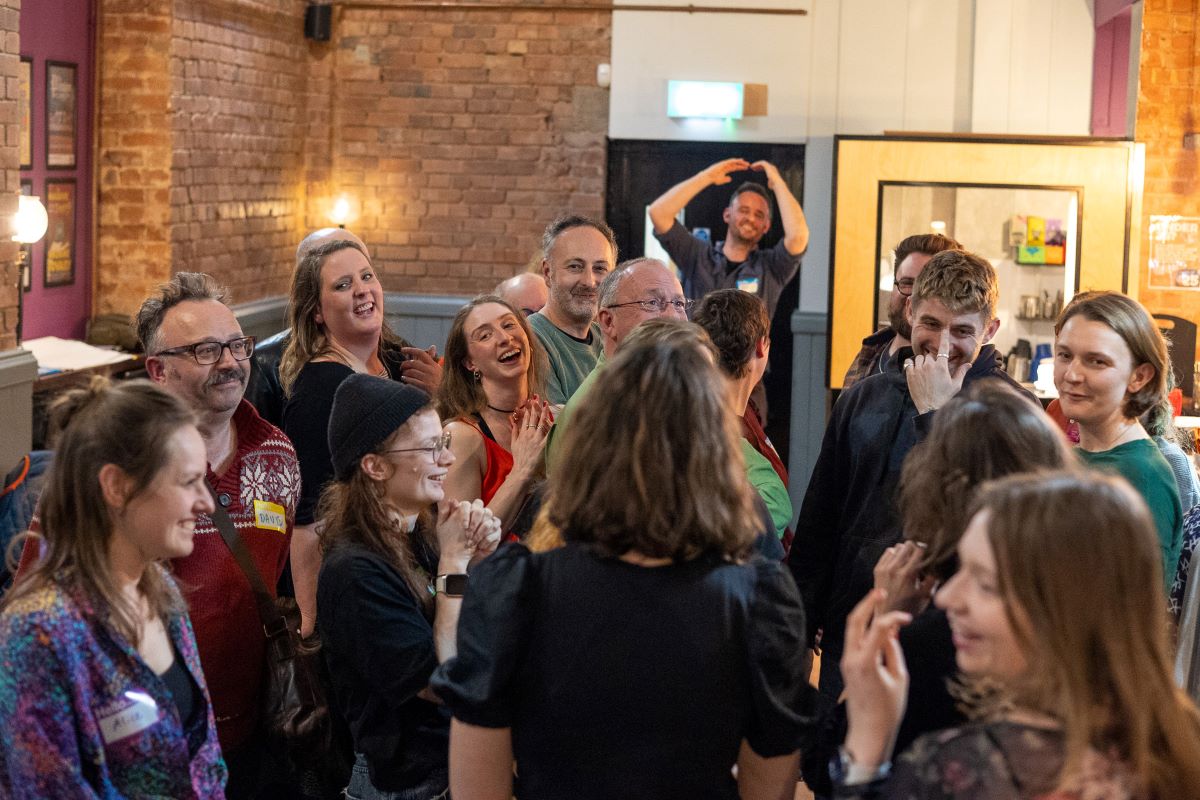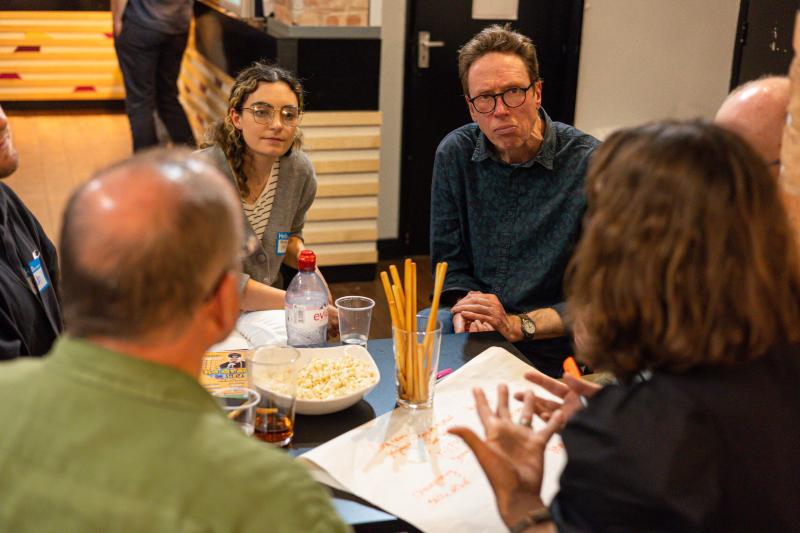
Participants at the launch of Failspace at the Exeter Northcott theatre
Photo: Kyle Carter
Fail, fail again, fail better
Failure is part of life. We all know this, creative folk perhaps better than most, says Katie Villa. But how can we learn to fail well?
As a freelance theatre director and parent, I’ve certainly had plenty of practice at failure. As messy, striving humans, we’re fairly accepting of failure. But how much do we value it, really? How comfortable are we with the failures of others? Are we brave enough to delve into our own?
But, perhaps the most important question I was asking myself a few weeks ago was: would anyone turn up to an arts networking event about failure? And I can answer that question: yes, they did.
I had pitched the idea to Exeter Northcott’s Creative Director, Martin Berry, in his first months in the role. I hadn’t meant to pitch an artists’ failure event, I was trying an elevator pitch for a mid-scale directing job, but my failure to successfully elevate myself pushed me somewhere far more interesting.
I was ranting to him about how the arts sector is bursting at the seams with talent and potential and how I was desperate to set up a networking event that felt nothing like a networking event. Something honest and authentic and fun and non-extractive. And I’d heard about a project called FailSpace.
An authentic antidote to schmoozing
FailSpace is an AHRC-funded research project led by Professors Leila Jancovich and David Stevenson, who gathered stories of failure from hundreds of participants across the arts sector. From these conversations they created a toolkit and an illustrated book, freely available on the Centre for Cultural Value’s website. These brilliant, evidence-backed tools met my desire for an authentic antidote to meaningless schmoozing. And with the kind permission of the project to use their excellent name, Exeter’s Artists’ Failspace was launched.
As a sector, there is no incentive to share failure. Overworked and under-resourced, artists fight for ever-shrinking puddles of funding, leading to evaluations and impact reports reflecting only the best of everything. Add to that the constant churn of upbeat social media and you have a perfect storm.
The pressure is greater than ever to prove value, to reassure funders, audiences and peers that we are a good investment, a safe pair of hands, and that we deserve to be here. Of course, we should celebrate our wins and shout successes from the rooftops, but what if we’re only telling half the story?
Failure is where the magic is. There is more learning buried in one tiny failure than in years of getting it right. But the greater the pressure on the arts, the less we seem able to talk about our screw ups – and it’s a vicious circle. Mid failure, you look around and it seems everyone else is doing fine. Filled with shame, you conclude you are the only one messing up, so you hide it. It is incredibly lonely and it is an incredible loss to the sector.
Continues…
 Photo: Kyle Carter
Photo: Kyle Carter
Failure is a great leveller
A resilient sector is one that fails well. That has structures in place to effectively measure failure and tools to extract the learning. That distributes this learning widely and without shame, recognising the value in it. That learns from the failure of others, ensuring no-one wastes valuable, underpaid time reinventing the wheel.
Part of the problem is that our current funding model requires reinventing the wheel and unintentionally disincentivises cross-sector sharing. Arts funders do laudable work shifting practice in positive directions but they have finite funds and need artists to evidence their exceptionalism. From bid to bid, pressure increases to do more, to do better and, importantly, to do it differently from the next bidder.
So, these small spaces are essential for more honesty, where evaluation and reflection can take place – not to tick boxes but to recognise the personal and communal value in doing so and the connection it brings. At our first Artists’ Failspace, I was struck by how great a leveller sharing a failure can be. It seemed to shortcut directly to meaningful conversations, in which laughter abounded and hierarchies abruptly flattened. Unlike a usual networking event, at a Failspace event the greater your influence and/or the higher your pay grade, the more catastrophic the failures you had to share. Talking creatively and openly about failure is a humble act – and a hugely generous one.
We are all going to need that generosity moving. When funds are tight and resources scarce, it can be tempting to raise drawbridges and hunker down. But a sustainable future is a generous one. If we are to navigate these stormy waters as a sector and ensure a survivable, thriveable future on our fragile plant, generosity is at the heart. This uncertain future demands we be the most creative ever and imagine seemingly impossible things into existence. Along the way we are definitely going to fail.
Which will give us plenty to talk about at the next Failspace.
Katie Villa is Artistic Director of Quirk Theatre, a freelance theatre maker and a Clore Leadership Fellow.
![]() exeternorthcott.co.uk/events/failspace/ | quirktheatre.co.uk/
exeternorthcott.co.uk/events/failspace/ | quirktheatre.co.uk/
![]() @ExeterNorthcott | @QuirkTheatre
@ExeterNorthcott | @QuirkTheatre
If you’re a creative based in the South West based, join us for Artists’ Failspace #2 on 20 June at the Barnfield Theatre.
Join the Discussion
You must be logged in to post a comment.